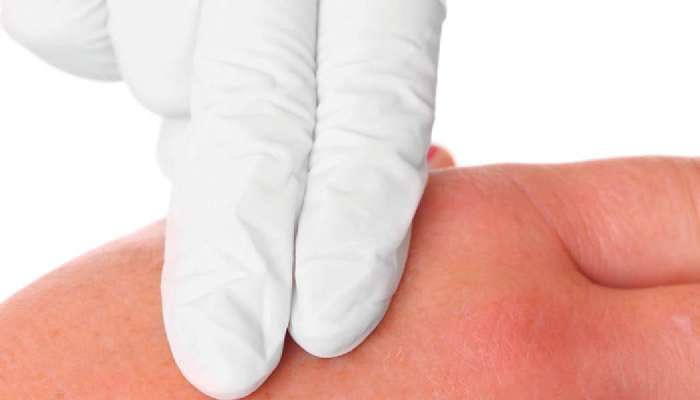
Natalie Metzger is living a life that once seemed impossible. At only 35 years old, she's already an award-winning director, writer and producer. She travels extensively, and her films have premiered at top festivals around the world including Sundance, Cannes and more. Being a filmmaker was an ambitious goal, but it wasn't until Natalie took charge of her life behind the camera and became an advocate for her health that pursuing this Hollywood dream was even an option.
Rare and potentially fatal
Natalie lives with a very rare and potentially life-threatening genetic condition called hereditary angioedema, or HAE. It causes unpredictable episodes of uncontrolled and often severe swelling that can impact areas of the body such as the hands, feet, stomach, face and even the throat, which can be fatal.
Natalie's father has HAE, which meant she had a 50-50 chance of inheriting the disease. When she began having symptoms at the age of 17, her parents' fear was confirmed - she, too, had HAE.
HAE swelling can last for days, and attacks can happen multiple times per month, impacting the ability to participate in everyday activities such as school, work and social events. Natalie's attacks worsened as she went to college, and HAE began taking a significant toll on her life.
"I was having an attack every couple of weeks," said Natalie. "I was in and out of the hospital all of the time."
While HAE episodes can occur for seemingly no reason, common triggers include physical injury, as well as Natalie's most frequent cause of attacks - stress. Since stress comes with filmmaking and extensive travel is also required - often daunting for those with HAE given the need to be near a hospital knowledgeable of and able to treat HAE in case of a severe attack - Natalie thought that she might not be able to pursue it as a career.
But, determined to live the life she wanted to live, Natalie began taking a proactive approach to managing her HAE. And things began to change.
A proactive approach
HAE can be treated in two ways. Acute medication is used to lessen symptoms when an attack is imminent or underway. And preventative medication is taken on an ongoing basis to help prevent HAE attacks and minimize their severity. Because HAE is a lifelong disease, preventing attacks can be a key part of regaining a sense of normalcy.
For Natalie, finding the right prophylactic treatment has made all the difference. Her swelling attacks are now well controlled, and if she has occasional breakthrough swelling, it's generally mild.
"When I was in college and considering what I was going to be doing with my life, I wasn't sure I'd be able to handle the demands of film because of my HAE, but on demand and preventative medications have been life changing," said Natalie. "They've really allowed me to have the career of my dreams - I'm able to make movies and go all around the world for film productions and festivals. I don't think I would be able to be a filmmaker if I didn't have my medication."
Treatment advances for HAE have come a long way in recent years and include medications that are taken in different ways, requiring varying levels of skill and time commitment to administer, giving those with HAE more options for finding the right treatment plan that fits their unique needs and lifestyle.
"We talk a lot about the burden of the condition, but the burden of treatment is something we've become more aware of as options have advanced," said Marc A. Riedl, MD, Clinical Director, US HAEA Angioedema Center. "When designing a treatment plan, patients should be open with their medical team about both their treatment goals and how treatment fits into their lifestyle. We're now reaching a point where people with HAE are often able to do the things they want in life without HAE or their treatments interfering."
While many with HAE have learned to tolerate difficult or inconvenient aspects of their treatment or may be afraid to "rock the boat" by trying a new treatment option, Natalie's experience shows that investing the time to find the right approach can be life changing.
"I've tried all of the preventative treatments over the years - intravenous, subcutaneous, and oral," said Natalie. "They're getting easier and easier to use and less invasive on my day-to-day life. It's amazing to think how far I've come personally and how far we've evolved in the HAE space."
Important advice for those facing health challenges
Given all that Natalie has been through, she has a few pieces of advice for anyone navigating the challenges of a condition like HAE:
1. Assess what YOU really want: Think about your goals. Consider your lifestyle, what factors are most important to you, the impact of the disease on your life and how treatment fits into it.
2. Have a plan: Preparation is key, especially when living with a chronic condition. Whether jotting down notes in advance of a doctor's appointment or ensuring you travel with the necessary medication, having a plan is essential to success.
3. Go for it: Be open and honest with your medical team. Have an empowered conversation about your goals in treatment and life. You should have a shared voice in your treatment decision-making process - studies show it leads to better outcomes.
Natalie recently got married and is looking ahead to what life and her busy career have in store for her next.
"Through my work, I'm able to pursue another passion - raising awareness of HAE and highlighting the stories of people impacted by this rare disease, as I did in the documentary 'Special Blood,'" she said. "I will continue to advocate for those with HAE to take charge of their health and pursue their own dreams while I live out mine." -BPT